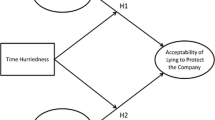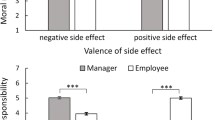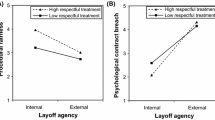Abstract
In this article, I aim at problematizing the implied idea of causality in cognitive evaluations of horizontal justice events. I will draw on theories about retrospective sensemaking and its cognitive foundation in counterfactual belief formation. Issues related to horizontal or intraunit unfairness emerge in situations in which the actions of one employee influence the outcome of another due to relational interdependence. The authors of theories about horizontal unfairness have continued the traditional distinction between the three facets of justice, procedural, distributive, and interactional. However, might employee A blame employee B because she (B) obtained qualitative (e.g., non-monetary appraisal) or quantitative (e.g., monetary compensation) recognition even though the latter did not, directly at least, bring about the event. The problem here is one of causality which asks the question, Can A be blamed by B for bringing about the event of outcome difference? While blame in evaluations of vertical justice certainly presumes causal agency, it might be questioned whether the same goes for horizontal unfairness. Counterfactual belief formation enables a step into the cognitive and retrospective nature of evaluations of horizontal justice events centered on the counterfactual belief “had the unfavorable event X not occurred, another and more favorable event X1 would have occurred.” This is related to the distance between the actual X and the potential event state X), in the sense that the closer the two appear, the more convincing becomes A’s belief to himself. The underlying causality of rewarding processes, however, states that some third party introduces the recognition, for example, a manager, and, therefore, B did not bring about the reward event, the third party did. It seems, then, that to understand this, we should take into consideration: 1) the formation of counterfactual beliefs and 2) the causality of blame. The article concludes that, due to the underlying causality of rewarding processes, one might solely consider one facet of horizontal justice, interactional horizontal justice. However, tapping into the phenomenological dimension of morality might allow one also to address the moral nature of distributive and procedural facets of horizontal justice as the experience of the psychosocial fabric of social reality related with feeling either “as if” one is being treated unfairly or “as if” one is treating others unfairly.
Similar content being viewed by others
References
Adams, J.S. 1963. Toward an understanding of inequity. Journal of Abnormal and Social Psychology 67: 422–436.
Akerlof, G., and R. Shiller. 2009. Animal spirits. Princeton: Princeton University Press.
Ambrose, M., and M. Schminke. 2001. Are flexible organizations the death knell or the future of procedural justice? In Justice in the workplace, ed. R. Cropanzano, 229–244. Mahwah: Lawrence Erlbaum Associates, Publishers.
Ambrose, M., and M. Schminke. 2007. Examining Justice Climate: Issues of Fit, Simplicity, and Content. In Multi-Level Issues in Organizations and Time (Research in Multi-Level Issues, Volume 6), ed. F. Fred Dansereau and J. Yammarino, 397–413. Bingley: Emerald Group Publishing Limited.
Aristotle. 350BC/1995. Nicomachean ethics. In The Complete Works of Aristotle, ed. Barnes, J., 1729–1867. Princeton: Princeton University Press, vol II.
Barnard, C. 1971. The functions of the executive. Cambridge: Harvard University Press.
Bloch, C. 2012. How do perpetrators experience bullying at the workplace. International Journal of Work Organisation and Emotion 5 (2): 159–177.
Bosch-Sijsema, P., R. Fruchter, M. Vartiainen, and V. Ruohomäki. 2011. A Framework to Analyze Knowledge Work in Distributed Teams. Group and Organizational Management 36 (3): 275–307.
Byrne, R.M.J. 1997. Cognitive processes in counterfactual thinking about what might have been. In The Psychology of Learning and Motivation, Advances in Research and Theory, ed. D.L. Medin, vol. 37, 105–154. San Diego: Academic Press.
Byrne, R. 2005. Rational imagination: How people create alternatives to reality. MIT Press.
Cropanzano, R., A. Li, and K. James. 2007. Intraunit justice and interunit justice and the people who experience them. In Research in Multi-Level Issues, eds. F. Dansereau and F. J. Yammarino, 6: 415-437. Oxford, UK: Elsevier.
Cropanzano, R., A. Li, and L. Benson. 2011. Peer justice and teamwork process. Group and Organization Management 36 (5): 567–596.
Descartes, R. 1993. Meditations on the first philosophy. Indianapolis: Hackett Publishing Company.
Eden, C. 1992. On the nature of cognitive maps. Journal of Management Studies 29 (3): 261–265.
Eden, C. 2004. Analyzing cognitive maps to help structure issues or problems. European Journal of Operational Research 159: 673–686.
Elias, N. 1956. Problems of involvement and detachment. The British Journal of Sociology 7 (3): 226–252.
Elster, J. 1999. Alchemies of the Mind: Rationality and the Emotions. Cambridge: Cambridge University Press.
Fehr, E., and U. Fischbacher. 2004. Third-party punishment and social norms. Evolution and Human Behavior 25: 63–87.
Fehr, E., and K. Schmidt. 1999. A theory of fairness, competition, and cooperation. The Quarterly Journal of Economics 114 (3): 817–868.
Fehr, E., and K. Schmidt. 2006. The Economics of fairness, reciprocity, and altruism – experimental evidence and new theories. In Handbook of the economics of giving, altruism, and reciprocity, ed. S. Kolm and J.M. Ythier, 615–691. Amsterdam: North-Holland.
Festinger, L. 1954. A theory of social comparison. Human Relations 7 (2): 117–140.
Festinger, L. 1957. A theory of cognitive dissonance – Anniversary edition. Stanford: Stanford University Press.
Folger, R. 1986a. A referent cognitions theory of relative deprivation. In Relative deprivation and social comparison: The Ontario symposium, eds. J. M. Olson, C. P. Herman, and M. P. Zanna, 4: 33–55. Hillsdale, NJ: Erlbaum.
Folger, R. 1986b. Rethinking Equity Theory. In Justice in Social Relations. Critical Issues in Social Justice, ed. H.W. Bierhoff, R.L. Cohen, and J. Greenberg, 145–162. Boston, MA: Springer.
Folger, R. 1987. Reformulating the preconditions of resentment: A referent cognitions model. In Social comparison, justice, and relative deprivation: Theoretical, empirical, and policy perspectives, ed. J.C. Masters and W.P. Smith, 183–215. Hillsdale, NJ: Erlbaum.
Folger, R., and R. Cropanzano. 1998. Organizational Justice and Human Resource Management. Thousand Oaks: Sage Publications.
Folger, R., and R. Cropanzano. 2001. Fairness Theory: Justice as Accountability. In Advances in Organizational Justice, ed. J. Greenberg and R. Cropanzano, 1–55. Stanford: Stanford University Press.
Gavanski, I., and G. Wells. 1989. Counterfactual processing of normal and exceptional events. Journal of experimental social psychology 25: 314–325.
Gleicher, F., K.A. Kost, S.M. Baker, A.J. Strathman, S.A. Richman, and S.J. Sherman. 1990. The role of counterfactual thinking in judgments of affect. Personality and Social Psychology Bulletin 16: 284–295.
Gioia, D., and K. Chittipeddi. 1991. Sensemaking and sensegiving in strategic change initiation. Strategic Management Journal 12 (6): 433–448.
Goodman, N. 1983. Fact, fiction, and forecast. Cambridge: Harvard University Press.
Greenberg, J. 1985. A taxonomy of organizational justice theories. Academy of Management Review 12 (1): 9–22.
Greenberg, J. 1990. Organizational Justice: Yesterday, Today, and Tomorrow. Journal of Management 16 (2): 399–432.
Greenberg, J., C. Ashton-James, and N. Ashkanasy. 2007. Social comparison processes in organizations. Organizational Behavior and Human Decision Processes 102 (1): 22–41.
Hegel, G.W. 1979. Phenomenology of spirit. Oxford: Oxford University Press.
Heider, F. 1958. The psychology of interpersonal relations. Mahwah. Lawrence Erlbaum.
Hilton, D., and B. Slugoski. 1986. Knowledge-based causal attribution: The abnormal conditions focus model. Psychological review 93: 75–88.
Homans, C.G. 1951. The human group. London: Routledge.
Hume, D. 2008. An Enquiry Concerning Human Understanding. Oxford: Oxford University Press.
Johnson, J.T. 1986. The knowledge of what might have been: Affective and attributional consequences of near outcomes. Personality and Social Psychology Bulletin 12: 51–62.
Kahneman, D. 1995. Varieties of counterfactual thinking. In What might have been: the social psychology of counterfactual thinking, ed. N. Roese and J. Olson. Psychology Press.
Kahneman, D. 2011. Thinking, Fast and Slow. London: Penguin Books
Kahneman, D., and D.T. Miller. 1986. Norm Theory: Comparing Reality to its Alternatives. In Heuristics and Biases: The Psychology of Intuitive Judgment, ed. T. Gilovich, D.W. Griffin, and D. Kahneman, 348–367. Cambridge: Cambridge University Press.
Kahneman, D., J.L. Knetsch, and R.H. Thaler. 1986. Fairness and the assumptions of economics. Journal of Business 59: 285–300.
Kahneman, D., and A. Tversky. 1973. Availability: A Heuristic for Judging Frequency and Probability. In Judgment under Uncertainty: Heuristics and Biases, ed. D. Kahneman, P. Slovic, and A. Tversky, 163–179. Cambridge: Cambridge University Press.
Kahneman, D., and A. Tversky. 1979. The Simulation Heuristic. In Judgment under Uncertainty: Heuristics and Biases, ed. D. Kahneman, P. Slovic, and A. Tversky, 201–211. Cambridge: Cambridge University Press.
Kahneman, D., and A. Tversky. 1982. The psychology of preferences. Scientific American 246: 160–173.
Kahneman, D., and C. Varey. 1990. Propensities of counterfactuals: The loser that almost won. Journal of Personality and Social Psychology 59 (6): 1101–1110.
Kant, I. 2007. Critique of Pure Reason. London: Penguin Books.
Katz, D., and R. Kahn. 1966. The social psychology of organizations. Oxford: Wiley.
Knorr-Cetina, K. 1981. Introduction: The micro-sociological challenge to macro-sociology. In Advances in social theory and methodology, ed. K. Knorr-Cetina and A. Cicourel, 1–47. Boston: Routledge.
Larsen, H., and M. Bogers. 2014. Innovation as Improvisation ‘In The Shadow’. Creativity and innovation management 23 (4): 386–399.
Lavelle, J.L., D.E. Rupp, J. Manegold, and M.A. Thornton. 2015. Multifoci justice and target similarity. In The Oxford handbook of justice in the workplace, ed. M. Ambrose and R.S. Cropanzano, 137–164. Oxford: Oxford University Press.
Leibniz, G.W. 2005. Discourse on Metaphysics and the Monadology. New York: Dover Publications.
Lewis, D. 1973. Counterfactuals. Oxford: Blackwell.
Li, A., Cropanzano, R. and Benson, L. 2007. Intraunit justice climate. Paper presented at the annual meeting of the Academy of Management.
Li, A., and R. Cropanzano. 2009. Fairness at the Group Level: Justice Climate and Intraunit Justice Climate. Journal of Managemen 35 (3): 564–599.
Li, A., R. Cropanzano, and J. Bagger. 2013. Justice climate and peer justice climate: a closer look. Small Group Research 44 (5): 563–592.
Li, A., R.S. Cropanzano, and A. Molina. 2015. Fairness at the unit level. In The Oxford handbook of justice in the workplace, ed. M. Ambrose and R.S. Cropanzano, 165–186. Oxford: Oxford University Press.
Lysgaard, S. 2001. Arbeiderkollektivet. Universitetsforlaget.
Mackie, J.L. 1974. The cement of the universe: A study of causation. Oxford: Oxford University Press.
Mandel, D., and D. Lehman. 1996. Counterfactual thinking and ascriptions of cause and preventability. Journal of Personality and social psychology 71 (3): 450–463.
Markman, K.D., I. Gavanski, S.J. Sherman, and M.N. McMullen. 1993. The mental simulation of better and worse possible worlds. Journal of Experimental Social Psychology 29: 87–109.
McKay, R., and P. McKiernan. 2004. Exploring strategy context with foresight. European Management Review 1 (1): 69–77.
McMullen, M.N., K.D. Markman, and I. Gavanski. 1995. Living in neither the best nor worst of all possible worlds: Antecedents and consequences of upward and downward counterfactual thinking. In What might have been: The social psychology of counterfactual thinking, ed. N.J. Roese and J.M. Olson, 133–167. Mahwah: Psychology Press.
Mead, G.H. 1967. Mind, self and society. Chicago: University of Chicago Press.
Medvec, V.H., and K.K. Savitsky. 1997. When doing better means feeling worse: A model of counterfactual cutoff points. Journal of Personality and Social Psychology 72: 1284–1296.
Merton, R.K. 1948. The self-fulfilling prophecy. The Antioch Review 8 (2): 193–210.
Mill, J.S. 1843. 1973. A system of logic ratiocinative and inductive. In Collected works of John Stuart mill (Vols. 7 and 8), ed. Robson, J. M. Toronto: University of Toronto Press.
Miller, D., and W. Turnbull. 1990a. The counter-factual fallacy: confusing what might have been with what ought to have been. Social Justice Research 4 (1): 1–19.
Miller, D.T., and S. Gunasegaram. 1990b. Temporal order and the perceived mutability of events: Implications for blame assignment. Journal of personality and social psychology 59: 1111–1118.
Moore, M.S. 2009. Causation and Responsibility: An Essay in Law, Morals, and Metaphysics. Oxford: Oxford University Press.
Orlikowski, W.J. 1996. Improvising Organizational Trasformation Over time: A Situated Change Perspective. Information Systems Research 7 (1): 63–92.
Peirce, C.S. 2011. Philosophical writings of Peirce – Revised. New York: Dover publications.
Pfeffer, J., and G. Salancik. 1978. A Social Information Processing Approach to Job Attitudes and Task Design. Administrative Science Quarterly 23 (2): 224–253.
Roese, N.J. 1994. The functional basis of counterfactual thinking. Journal of Personality and Social Psychology 66: 805–818.
Roese, N.J. 1997. Counterfactual thinking. Psychological Bulletin 121: 133–148.
Rosen, G. 2011. Causation, Counterfactual Dependence, and Culpability. Rutgers Law Journal 42 (2): 405–437.
Rupp, D., and C. Bell. 2010. Extending the Deontic Model of Justice: Moral Self-Regulation in Third-Party Responses to Injustice. Business Ethics Quarterly 20 (1): 89–106.
Salancik, G. 1977. Commitment and the Control of Organizational Behavior and Belief. In New Directions in Organizational Behavior, ed. B. Staw and G. Salancik, 1–54. Chicago: St. Clair Press.
Sandberg, J., and H. Tsoukas. 2015. Making sense of the sensemaking perspective: Its constituents, limitations, and opportunities for further development. Journal of Organizational Behavior 36: S6–S32.
Sanna, L.J. 1996. Defensive pessimism, optimism, and simulating alternatives: Some ups and downs of prefactual and counterfactual thinking. Journal of Personality and Social Psychology 71: 1020–1036.
Schutz, A. 1967. Phenomenology of the social world. Evanston: Northwestern University Press.
Schwarz, N., and L.A. Vaughn. 2002. The Availability Heuristic Revisited: Ease of Recall and Content of Recall as Distinct Sources of Information. In Heuristics and Biases: The Psychology of Intuitive Judgment, ed. T. Gilovich, D.W. Griffin, and D. Kahneman, 103–120. Cambridge: Cambridge University Press.
Shaver, K.G. 1985. The Attribution of Blame. New York: Springer-Verlag.
Stacey, R. 2000. Reflexivity, self-organization, and emergence in the group matrix. Group Analysis 33 (4): 501–514.
Stacey, R. 2001a. What can it mean to say that the individual is social through and through? Group Analysis 34 (4): 457–471.
Stacey, R. 2001b. Complex responsive processes in organizations. London: Routledge.
Stacey, R. 2003. Learning as an activity of interdependent people. The learning organization 10 (6): 325–331.
Stacey, R. 2007. The challenge of human interdependence: Consequences for thinking about the day to day practice of management in organizations. European Business Review 19 (4): 292–302.
Stalnaker, R.C. 1968. A theory of conditionals. In Studies in logical theory, ed. N. Rescher, 98–112. Oxford: Blackwell.
Starbuck, W. 2015. Karl E. Weick and the dawning awareness of organized cognition. Management of Decision 53 (6): 1287–1299.
Turillo, C.J., R. Folger, J.J. Lavelle, E.E. Umphress, and J.O. Gee. 2002. Is Virtue Its Own Reward? Self-Sacrificial Decisions for the Sake of Fairness. Organizational Behavior and Human Decision Processes 89 (1): 839–865.
Tversky, A., and Kahneman, D. 1982. The psychology of preferences. Scientific American 246: 160–173.
Weber, P., and M. Manning. 2001. Cause maps, sensemaking, and planned organizational change. The Journal of Applied Behavioral Science 37 (2): 227–251.
Weick, K.E. 1995. Sensemaking in organizations. Thousand Oaks: Sage Publications.
Weick, K.E. 2001. Making sense of organizations. Malden: Blackwell Publishing.
Weick, K.E. 2009. Making sense of the organization: The impermanent organization. New York: Wiley.
Weick, K.E. 2010. Reflections on Enacted Sensemaking in the Bhopal Disaster. Journal of Management Studies 47 (3): 537–550.
Wolf, S. 2013. The Moral of Moral Luck. Philosophic Exchange 31 (1): article 1.
Author information
Authors and Affiliations
Corresponding author
Rights and permissions
About this article
Cite this article
Petersen, M.L. Horizontal Unfairness and Retrospective Sensemaking. Philosophy of Management 18, 5–22 (2019). https://doi.org/10.1007/s40926-018-0084-3
Published:
Issue Date:
DOI: https://doi.org/10.1007/s40926-018-0084-3




